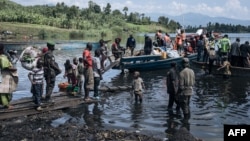The Democratic Republic of the Congo, or DRC, is struggling with the most complex and long-standing humanitarian crisis in Africa.
The problems stem from decades of off-and-on belligerence, which has continued since the country got its independence from Belgium in 1960. Today, more than a hundred armed groups are fighting for control of the mineral-rich region of Eastern Congo near the border with Rwanda.
However, two groups with antecedents in the Rwandan civil war of the 1990s, cause the most concern. The 23 March Movement, or M23 is making significant advances and expanding its territory. M23 is supported by Rwanda, whose military forces have crossed the DRC’s border in its support.
On the other hand, the Democratic Forces for the Liberation of Rwanda, or DFLR, has ties to the Congolese army. Both groups have been sanctioned the United States and the United Nations.
Working to maintain peace in the area over the past 25 years has been the UN Stabilization Mission in the Democratic Republic of the Congo, or MONUSCO, which is in the process of withdrawing from the DRC.
“The aggressive military incursion into eastern DRC by … M23 and the Rwandan Defense Force has put the mission’s uniformed and civilian personnel under immense strain,” said Robert Wood, U.S. Alternative Representative at the UN.
“We have repeatedly publicly condemned Rwanda’s incursions in eastern DRC, its continued support for M23 – a group which has perpetrated appalling human rights abuses against civilians, including sexual and gender-based violence – and RDF attacks against MONUSCO positions and equipment,” he said.
“The international community’s silence in the face of such brazen actions … is equally dismaying,” said Ambassador Wood. “Without a change in Rwanda’s behavior, it is clear the UN should reevaluate Rwanda’s credibility as a constructive participant in peacekeeping. The DRC must also cease and condemn incidents – intentional and unintentional – of elements of its security forces and aligned armed actors.”
“There is no military-only solution to the crisis in eastern DRC,” said Ambassador Wood. “The United States strongly supports the efforts led by regional actors to resume the Nairobi and Luanda processes, which offer the most viable paths toward resolving this 30-year conflict.”
“Ultimately, peace is a political decision,” said Ambassador Wood. “The United States calls on the leaders of Rwanda and the DRC to make the decision to pursue peace – for the sake of their people, the region, and the world.”














